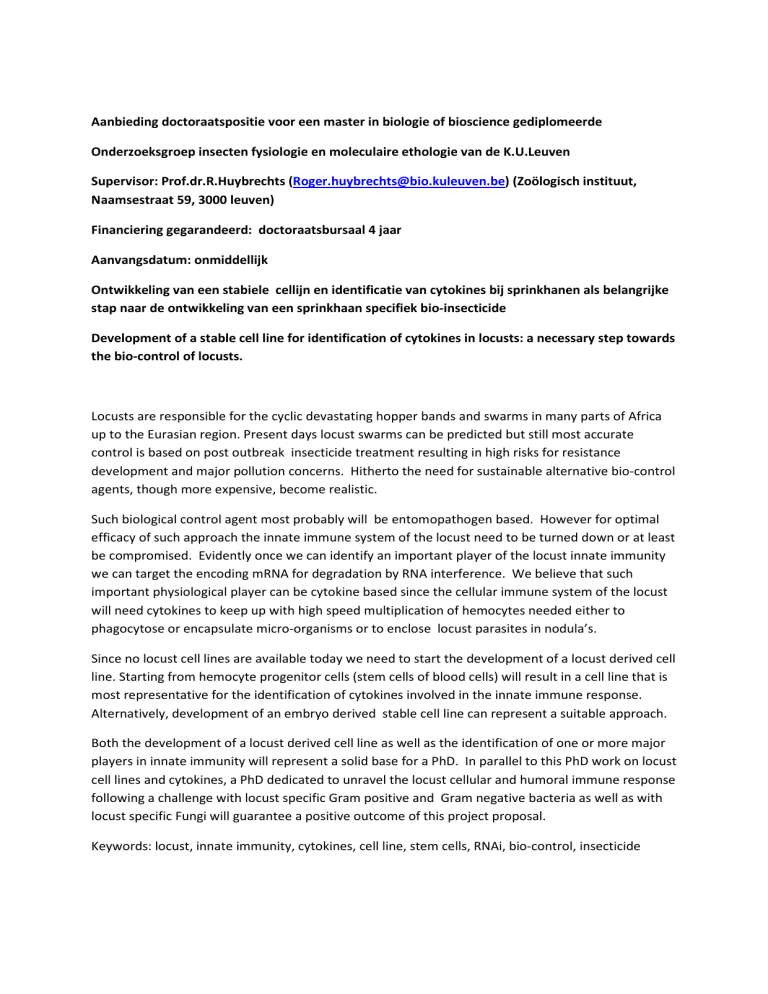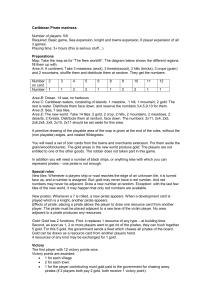
Aanbieding doctoraatspositie voor een master in biologie of bioscience gediplomeerde
Onderzoeksgroep insecten fysiologie en moleculaire ethologie van de K.U.Leuven
Supervisor: Prof.dr.R.Huybrechts ([email protected]) (Zoölogisch instituut,
Naamsestraat 59, 3000 leuven)
Financiering gegarandeerd: doctoraatsbursaal 4 jaar
Aanvangsdatum: onmiddellijk
Ontwikkeling van een stabiele cellijn en identificatie van cytokines bij sprinkhanen als belangrijke
stap naar de ontwikkeling van een sprinkhaan specifiek bio-insecticide
Development of a stable cell line for identification of cytokines in locusts: a necessary step towards
the bio-control of locusts.
Locusts are responsible for the cyclic devastating hopper bands and swarms in many parts of Africa
up to the Eurasian region. Present days locust swarms can be predicted but still most accurate
control is based on post outbreak insecticide treatment resulting in high risks for resistance
development and major pollution concerns. Hitherto the need for sustainable alternative bio-control
agents, though more expensive, become realistic.
Such biological control agent most probably will be entomopathogen based. However for optimal
efficacy of such approach the innate immune system of the locust need to be turned down or at least
be compromised. Evidently once we can identify an important player of the locust innate immunity
we can target the encoding mRNA for degradation by RNA interference. We believe that such
important physiological player can be cytokine based since the cellular immune system of the locust
will need cytokines to keep up with high speed multiplication of hemocytes needed either to
phagocytose or encapsulate micro-organisms or to enclose locust parasites in nodula’s.
Since no locust cell lines are available today we need to start the development of a locust derived cell
line. Starting from hemocyte progenitor cells (stem cells of blood cells) will result in a cell line that is
most representative for the identification of cytokines involved in the innate immune response.
Alternatively, development of an embryo derived stable cell line can represent a suitable approach.
Both the development of a locust derived cell line as well as the identification of one or more major
players in innate immunity will represent a solid base for a PhD. In parallel to this PhD work on locust
cell lines and cytokines, a PhD dedicated to unravel the locust cellular and humoral immune response
following a challenge with locust specific Gram positive and Gram negative bacteria as well as with
locust specific Fungi will guarantee a positive outcome of this project proposal.
Keywords: locust, innate immunity, cytokines, cell line, stem cells, RNAi, bio-control, insecticide










